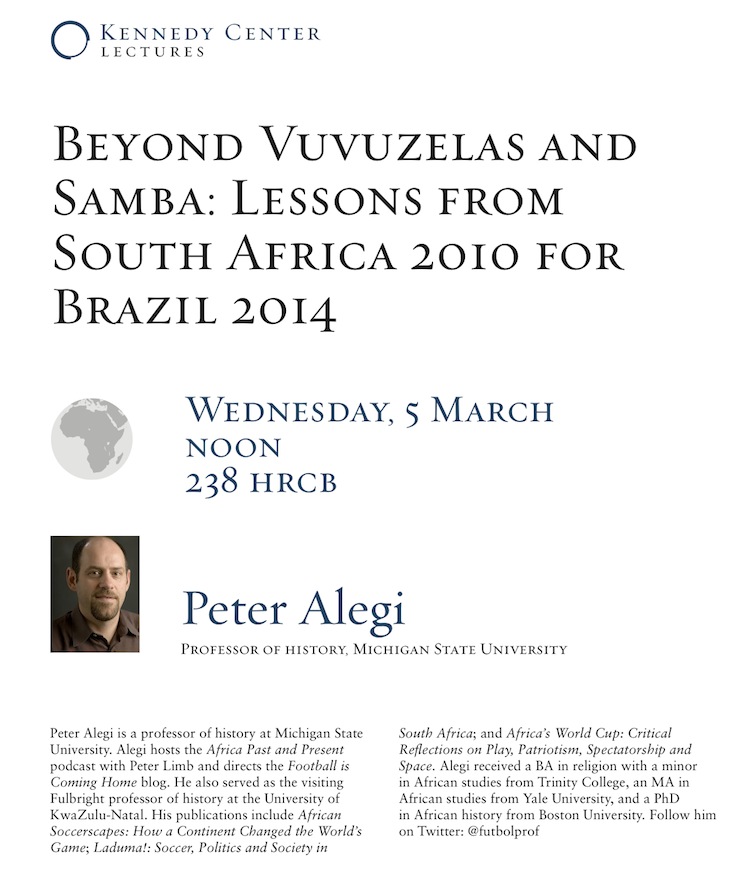 Listen to “Beyond Vuvuzelas and Samba: Lessons from South Africa 2010 for Brazil 2014,” a lecture I delivered at Brigham Young University’s David M. Kennedy Center for International Studies on March 5, 2014.
Listen to “Beyond Vuvuzelas and Samba: Lessons from South Africa 2010 for Brazil 2014,” a lecture I delivered at Brigham Young University’s David M. Kennedy Center for International Studies on March 5, 2014.
The talk analyzes the political, economic, and cultural dynamics of the 2010 FIFA World Cup in South Africa and its similarities to the upcoming 2014 FIFA World Cup in Brazil.
Click here to watch the video.
Tag: Vuvuzela
Kaizer Chiefs Boss Against Vuvuzelas
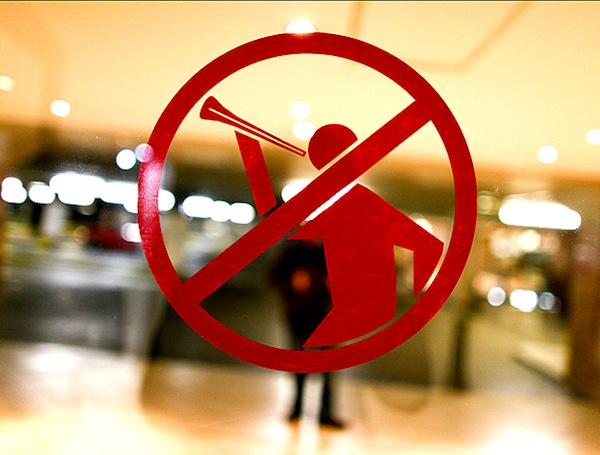
Four months ago the vuvuzela was the symbol of South African football and the Africanization of the World Cup. Now the founder and owner of Kaizer Chiefs — Kaizer Motaung — says publicly that he does not like vuvuzelas at matches.
This statement came in the wake of a 500,000 rand fine imposed on Chiefs by the Premier Soccer League after their fans threw two vuvuzelas (and cabbage) onto the pitch during their MTN8 semi-final loss against Orlando Pirates at Soccer City on September 26. PSL prosecutor Zola Majavu said: “It is only my opinion, but if this trend continues we will have to act more strongly.”
“Vuvuzelas take something away from our games,” said Motaung. “To me, vuvuzelas are just a noisy thing people like, but I prefer to watch fans like Bloemfontein Celtic sing and dance and support their team.”
I’ve noticed fewer vuvuzelas at PSL matches recently so perhaps South African fans are beginning to tire of the decibel-blasting plastic horn. A reader’s comment on the sport24 web site may be indicative that the tide is turning: “True Motaung – Vuvuzelas are a noise making gadget that does not contribute to the game. But do not ban it Majavu. Sooner [rather] th[a]n later people will start leaving their Vuvuzelas at home and start singing at the stadiumz.”
Postings on The Sowetan web site were split on the issue. On the one hand, patriotic populists like Popeye ask: “How can you ban vuvuzela? Recently It has been added to Oxford dictionary . . . [It is] Proudly South African. Rich people can not change the world.” On the other hand, nostalgics like Mthondosheshayo agree with Motaung: “vuvuzelas are not adding anything to our soccer. What happened to the singing, dancing and whistling in the stadiums?”
Writing on kickoff.com — the online edition of the country’s leading football magazine — KaMashobana reminded everyone of the “invented tradition” of the vuvuzela: “Ban them or not, the only truth is Vuvuzelas are not part of our culture. One Boer [Afrikaner] who came with the idea of making money decided to use us. Its only a fool who can stand up and say this instrument is our culture. Where was it in 1996?” when Bafana Bafana triumphed in the African Nations Cup.
Other supporters criticized Motaung’s motives for backing a potential ban of the vuvuzela from South African grounds. “Keep your supporters in check instead of wanting to dictate terms to the rest of us,” wrote KebraNagast. “If you hadn’t gotten the fine you probably wouldn’t have said anything.” Other fans pointed to local football’s culture of defiance to suggest that a ban would not work. “Good Luck with that,” stated a user on the sport24 site. “We all know that in this country we have problems with authority, and the more people tell us not to do things, the more we like to do it.”
Ultimately, a voluntary halt to “doing vuvuzela” would be preferable to prohibition in a country where press freedom is under threat by the proposed Media Appeals Tribunal, the Protection of Information Bill, and the intimidation of reporters.
UEFA bans vuvuzelas
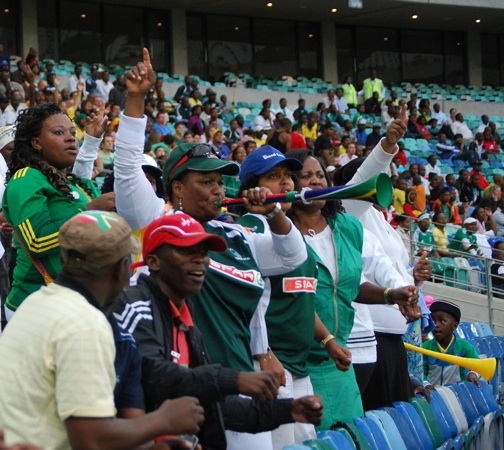
UEFA announced that vuvuzelas will not be permitted in European stadia hosting UEFA competitions. ‘The magic of football consists of the two-way exchange of emotions between the pitch and the stands, where the public can transmit a full range of feelings to the players,’ explained the European confederation’s web site. ‘However, UEFA is of the view that the vuvuzelas would completely change the atmosphere, drowning supporter emotions and detracting from the experience of the game.’
Curbing fans’ freedom to express themselves is generally not my cup of tea, but maybe these self-interested football technocrats are helping to preserve what’s left of stadium soundscapes and our hearing.
Click here to read the UEFA statement.
Vuvuzelas Banned Abroad
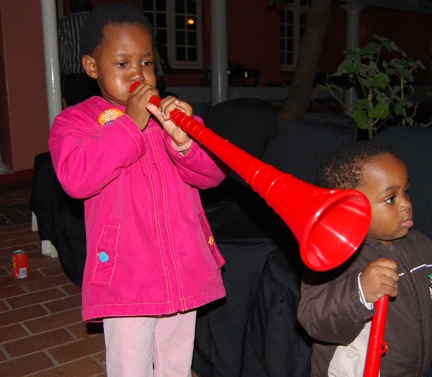
South Africa 2010’s major cultural legacy — the vuvuzela plastic horn — is spreading like a plague across planet football. This Made-in-China ‘invented tradition’ has drowned out the chants, songs, praise poetry, music (yes, music) and other organic collective sounds that used to accompany the ebb-and-flow of the game in South Africa. A Kenyan friend pointed out to me that the term vuvuzela is being used both as a noun and a verb.
However, there is increasing evidence from overseas that a movement is growing in opposition to the notion that the stadium experience can be reduced to the deafening sound of wailing goats. Six English Premier League clubs — Tottenham Hotspur, Arsenal, Birmingham, Everton, Fulham and West Ham — have banned vuvuzelas from their home grounds and others are likely to follow suit. In the United States, where the infernal horn is already in MLS stadiums, the New York Times reports that the New Meadowlands Stadium has been declared a ‘vuvuzela-free zone’ for the USA-Brazil friendly on August 10.
Read the article here.
Vuvuzela 1 PSL 0
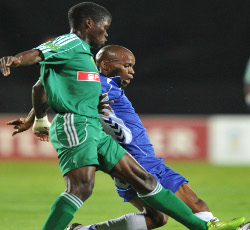
A family night out with 6,000 friends. Maritzburg United vs Amazulu: KwaZulu-Natal derby in the round of 32 of the Nedbank Cup, South Africa’s FA Cup. At kickoff, deafening kwaito music gives way to a cacophony of vuvuzelas. Not exactly kid friendly, but there it is. The relaxed mood of this Saturday night crowd, a pleasant mix of men, women and children of all backgrounds, makes up for the dreadful football on display.
The home side is slightly more enterprising in the second half, but deep into injury time the visitors’ Brad Ritson scores a counter-attack winner. Cruel. Final.
As we, the deflated masses, leave the friendly confines of Harry Gwala Stadium, I found myself wondering — again — why PSL teams played such awful soccer on a regular basis. Then I thought of the wisdom shared by Thabo Dladla, director of Izichwe Youth Football (where my daughter plays), in his column this week:
‘The idea of playing and keeping the ball longer does not exist . . . [with] less than 100 completed passes in most PSL matches’ Dladla writes, ‘I doubt if Lionel Messi would have played under most South African coaches. [In the apartheid era] football played a huge role in entertaining people. It was important to win in style. Both players and fans had a lot of fun during a game. These days one sees more creativity in the grandstands than on the field’. And as much as I viscerally detest the vuvuzela’s sonic pollution, it is the truth.
FIFA denied my request for tickets so I followed the Confederations Cup from home. I drew on my observations from afar as well as media coverage and conversations with friends in South Africa to learn these five things from the tournament:
1. This beautiful yet scarred country will host an eventful World Cup next year. The stadiums are nice and the climate in different cities may surprise visitors. Also, the difficulties with transport, accommodation, communications, and moving people to the stadiums may be mitigated by next year but are not likely to disappear.
2. The Confed Cup is not a terribly interesting competition. It features too many marginal sides (New Zealand, Iraq, South Africa) and tired European giants (Spain and Italy). No wonder we had to depend on the depth and individual brilliance of Brazil and the do-or-die attitude of the improving USA for entertainment.
3. Despite what the organizers tell us, the vuvuzelas are not part of South Africa’s ‘traditional’ fan culture. The horns appeared in the mid-1990s and did not become widespread until a few years ago. And they were ‘invented’ by a white guy.
4. The trend of the past decade that saw raw speed and set pieces decide so many matches will probably continue in 2010. Given the heavy-handed emphasis on defensive tactics, the pace of players like Kaka’ offers precious opportunities to burst through defensive walls and exploit open space on counter-attacks. Corners and free kicks are key, just ask the USA and South Africa.
5. The 2010 World Cup is a huge national project aimed at enhancing ‘Brand South Africa’ — the image of the country as a modern, democratic, business-friendly, tourist destination. Football-crazy South Africans legitimize this political and economic agenda, even though they pay billions to host the event while FIFA keeps most of the financial profits.
South African defender Matthew Booth decided to film his teammates during the recent Confederations Cup competition. (Remember him? He’s the only white guy in the team who fans greet with a loud “Boooottthhh” whenever he touches the ball and who Spanish reporters, looking for black racism decided was booed by the fans.) Booth, who maintains quite an active Youtube channel, regularly films his teammates, and in the video, above, captured them (and their Brazilian coach Joel Santana) singing on camera in the dressing room before their game against Spain in the first round. Check it out. (Here‘s another example.) It also made me wonder again why South African fans don’t leave the vuvuzelas outside the stadium and do some actual singing? That would not sound only better, but would present an actual, not corporate-induced part of football culture in that country, to visiting fans.